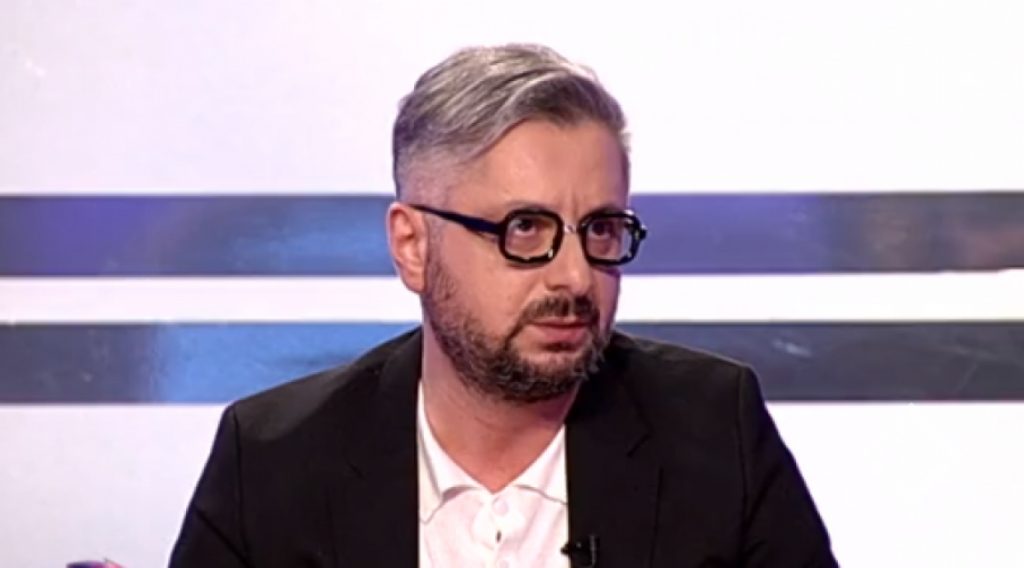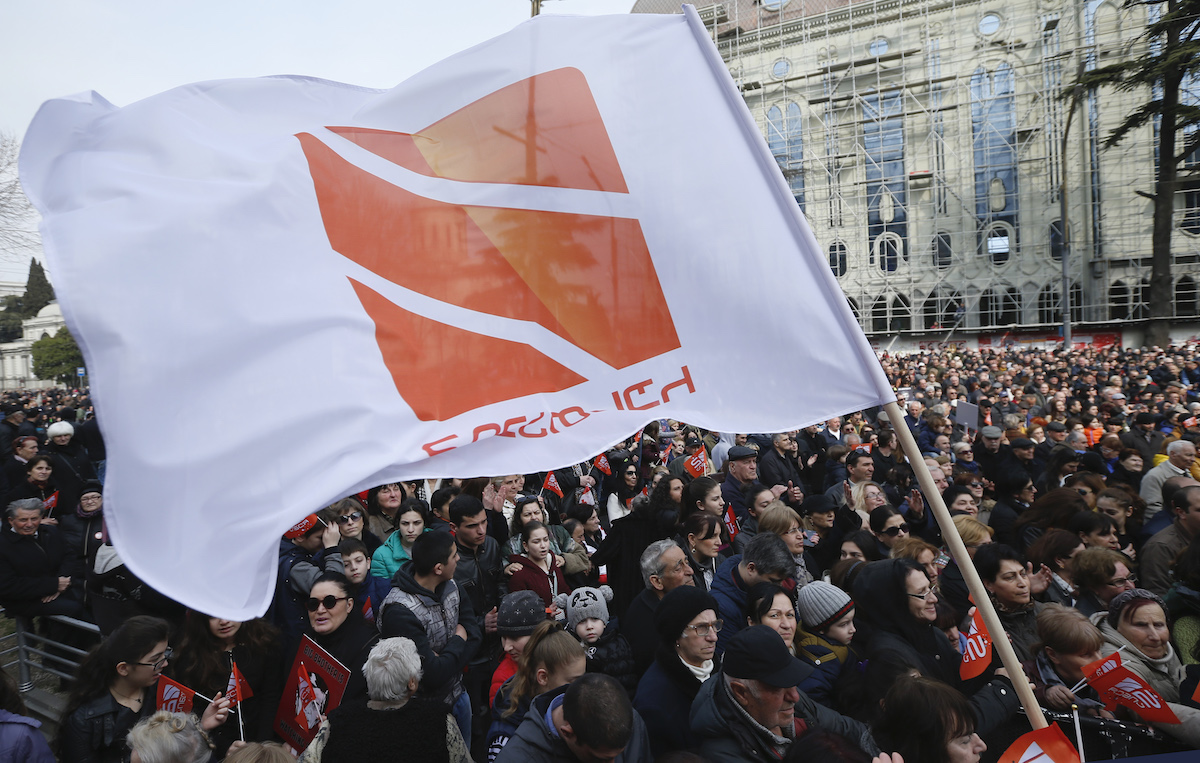Why head of opposition Georgian TV channel was convicted and what we know about his case
Head of opposition Mtavari TV channel convicted in Georgia
On May 16, Nika Gvaramia, director of the most popular opposition Mtavari TV channel, was arrested in the courtroom in Tbilisi. He was sentenced to three years and six months in prison for allegedly using a company car for family needs.

Independent experts, representatives of public organizations and politicians consider Gvaramia’s arrest to be politically motivated.
The US Embassy strongly criticised the court’s decision. “The disturbing pattern of selective investigations and prosecutions targeting those in opposition to the current government undermines the public’s confidence in the police, prosecution, the courts, and the government itself”, the embassy said in a statement.
- How should the modern history of Georgia be taught?
- The aftermath of ex-president Saakashvili’s hunger strike – what will happen next?
- Increased reliance on individual leaders: narratives of Georgia’s modern history
What is Nika Gvaramia accused of?
All charges brought against Gvaramia are related to his tenure as director of the formerly famous opposition TV channel Rustavi-2 in 2014-2019.
The prosecution alleges that Gvaramia embezzled property rights, falsified documents, laundered money and engaged in commercial bribery during his tenure as the CEO of Rustavi-2.
In particular, according to the prosecutor’s office, Gvaramia unfairly disposed of the right to place commercial advertising on the channel. It is alleged that he sold the rights at a reduced price to Inter Media Plus LLC, in exchange for which he received two apartments from the Even company. Then, according to the indictment, he sold these apartments and thus laundered the money.
According to the prosecutor’s office, Gvaramia used forged documents, stamps, seals and forms for the purpose of carrying out this scheme.
Court found Gvaramia guilty on two counts of abuse of power
According to the first charge, in 2015, Gvaramia unfairly disposed of the right to advertise on the channel and, together with the financial director of the company, Kakha Damenia, squandered 6,763,509 lari. For this episode, Gvaramia and Damenia were fined 50,000 lari.
The second charge on which Gvaramia was arrested, the so-called ‘car episode’, involved the placing of TV commercials on Rustavi-2, in exchange for which, the Proesco Media LLC retained formal ownership of a luxury vehicle ( Porsche Macan S worth 76,000 euros) used by Gvaramia and his family.
Human rights defenders and lawyers’ response
Gvaramia was arrested in the courtroom. Before going to prison, he managed to write the last post on Facebook and cheer up his supporters:
“You just stay with Mtavari and achieve freedom with us! Everything will be fine”, he wrote.
Local and international NGOs in Georgia, as well as independent lawyers and experts who studied and followed the Gvaramia case, state that there is no evidence of Gvaramia’s guilt and he was actually convicted for his management decisions as a form of political prosecution:
“This verdict is a continuation of the political persecution that has been waged against Government’s opponents for years”, Transparency International Georgia said in a statement. The organization studied the Gvaramia case a year ago and concluded that “most of the allegations against Nika Gvaramia are related to his management decisions made in 2015”.
“The use of the justice system for media censorship and intimidation sends a clear message to other critical media outlets as well”, Transparency International Georgia said in a statement.
The Public Defender of Georgia also notes in her statement that the decisions for which Gvaramia was charged were agreed with the owner of the enterprise (ie, the current director of Rustavi-2).
Nino Lomjaria said that her office had studied similar cases in the courts of the United States, Great Britain, continental Europe and Georgia, and not a single case was found in which not only criminal, but even corporate liability was established in such cases.
Another prominent non-governmental organization, the Association of Young Lawyers of Georgia, also notes that Gvaramia’s sentence is legally problematic and associated with several ‘suspicious’ circumstances.
The organization claims that the charges against Nika Gvaramia are illegal and politically motivated. The organization points out that Gvaramia is the general director of a broadcaster with an opposition-minded editorial policy and the owner of 51% of the channel’s shares.
Thus, the court decision extends upon the entire channel, GYLA notes.
After Gvaramia’s arrest, the opposition, civil society and the media began to discuss the action plan which will be made public soon.
Politicians’ assessments and the fate of Georgia’s EU questionnaire
Politicians and experts pay special attention to the fact that the arrest of the director of a popular opposition channel coincided with the period of consideration of Georgia’s application for EU membership.
Mamuka Khazaradze, leader of the Lelo party, believes that Gvaramia’s arrest is a direct sign of a threat to Georgia’s European choice:
“The ruling Georgian Dream party is moving towards Russia”.
“Our strategic partners are constantly calling on us to stop polarization and political escalation. And today’s unfair decision has brought the situation intto a further dead end”, Khazaradze said.
“The country will pay dearly for this. On the way to European integration, Georgia is becoming known for the increase in the number of political prisoners. All this will receive an adequate response from our Western partners”, said Nika Melia, leader of the opposition United National Movement.
Giga Bokeria, leader of the opposition European Georgia Party, sees the arrest of Nika Gvaramia as a sign of increased authoritarianism and a demonstration of force on the part of the oligarch Bidzina Ivanishvili and his entourage:
“While they are in power, the country is moving in the opposite direction from freedom, along the path of authoritarianism, Putin’s oligarchic regime”.
“Ivanishvili fears that the West will impose sanctions against him, and he will be able to use Gvaramia as a political prisoner for ‘trade’ with the West”, said Giorgi Vashadze, leader of the Strategy Agmashenebeli party.
Zurab Japaridze, leader of the Girchi-More Freedom party, believes that the purpose of Gvaramia’s arrest is to disable the main opposition channel, as “they want to stay in power for a long time”.
“They will only be stopped by a large number of angry people who will take to the streets”, Japaridze said.
What Western partners say
“Today’s ruling, in the cases of Gvaramia, Iashvili, and Damenia, calls into question Georgia’s commitment to rule of law, and further demonstrates the fundamental importance of having an independent, impartial judiciary in Georgia”, the US Embassy in Georgia said in a statement.
The embassy notes that this case “selective investigations and prosecutions targeting those in opposition to the current government undermines the public’s confidence in the police, prosecution, the courts, and the government itself” which is “alarming”.
The embassy emphasizes the fact that Gvaramia was detained at a time when “Georgia has an unprecedented opportunity to deepen its Euro-Atlantic integration”.
“Even the perception of politicized prosecution is detrimental”, the US Embassy wrote on its Facebook page.
Acting British Ambassador to Georgia Claire Albles said she was disappointed with the arrest of Nika Gvaramia.
“The UK is the watchdog of the free media. Without free media, citizens will not be able to exercise their democratic rights”, Olbles said in a statement




















